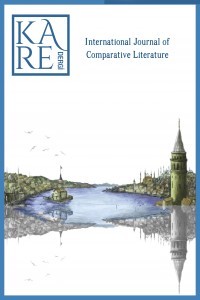Literatures in Translation: Literary Translation and Comparative Literature in the Turkish Context
yazın çevirisi, çeviri edebiyat, karşılaştırmalı edebiyat, çeviribilim, dünya edebiyatları
Literatures in Translation: Literary Translation and Comparative Literature in the Turkish Context
translation literary translation, comparative literature, translated literature, translation studies, world literature,
___
- Aytaç, Gürsel. Genel Edebiyat Bilimi. İstanbul: Say, 2003.
- Bassnett, Susan. Translation Studies. New York: Routledge, 2002.
- Bassnett, Susan. “Reflections on Comparative Literature in the Twenty-First Century,” Comparative Critical Studies, 3.1, 2006, pp. 3-11. doi:10.1353/ccs.2006.0002.
- Belge, Murat. “Karşılaştırmalı Edebiyat,” Notos 6 (Aralık-Ocak), 2018, pp. 38-45.
- Bermann, Sandra. “Teaching in—and about—Translation,” Profession, Modern Language Association, 2010, pp. 82-90, http://www.jstor.org/stable/41419864.
- Bibbò, Antonio. “Comparative Literature and Translation History.” In The Routledge Handbook of Translation History, pp. 139-154. New York: Routledge, 2021.
- Bernheimer, Charles. Comparative Literature in the Age of Multiculturalism. Baltimore: The Johns Hopkins University Press, 1995.
- Cronin, Michael. “Double Take: Figuring the Other and the Politics of Translation.” In Translation – Reflections, Refractions, Transformations. Edited by Paul St-Pierre and Prafulla C. Kar. pp. 277-288. Amsterdam: John Benjamins Publishing Company, 2007.
- Even-Zohar, Itamar. “The Position of Translated Literature within the Literary Polysystem,” Poetics Today, 11.1, 1990, pp. 45-51.
- Even-Zohar, Itamar. Papers in Culture Research. Tel Aviv: Tel Aviv University, 2010.
- Heise, Ursula K. Futures of Comparative Literature: ACLA State of the Discipline Report. New York: Routledge, 2017.
- Large, Duncan. “Translation Studies versus Comparative Literature?” Fudan J. Hum. Soc. Sci. 8, 2015, pp. 347-354. https://doi.org/10.1007/s40647-015-0080-0.
- Munday, Jeremy. Introducing Translation Studies. New York: Routledge, 2016.
- Newmark, Peter. A Textbook of Translation. London: Longman, 2003.
- Ning, Wang and Cesar Dominguez. “Comparative Literature and Translation: A Cross-cultural and Interdisciplinary Perspective.” In Border Crossings: Translation Studies and Other Disciplines, pp. 287-308. Amsterdam: John Benjamins Publishing Company, 2016. https://doi.org/10.1075/btl.126.
- Özyön, Arzu. “An Overview of the History of Comparative Literature and the Recent State of Comparative Literature Studies in Turkey,” Curr Res Soc Sci, 6.1, 2020, pp. 1-9. 10.30613/curesosc.592296.
- Prunč, Erich. Einführung in die Translationswissenschaft. Bd.1 Orientierungsrahmen. 2., erweiterte und verbesserte Auflage. Graz: ITAT, 2002.
- Rundholz, Adelheid and Mustafa Kirca. “Reading Rushdie in Translation: Midnight’s Children, Postcolonial Writing/Translation, and Literatures of the World,” Translation and Literature, 30.3, 2021, pp. 332-355. https://doi.org/10.3366/tal.2021.0480.
- Sakallı, Cemal (Ed.). V. Uluslararası Karşılaştırmalı Edebiyat Bilimi Kongresi Bildiriler. Mersin: Mersin Üniversitesi Yayınları, 2015.
- Saussy, Haun. Comparative Literature in an Age of Globalization. Baltimore: The Johns Hopkins University Press, 2006.
- Schlumpf, Erin. “Intermediality, Translation, Comparative Literature, and World Literature,” Comparative Literature and Culture, 13.3, 2011. https://doi.org/10.7771/1481-4374.1814.
- Stolze, Radegundis. Übersetzungstheorien. Eine Einführung. 2. Auflage. Tübingen: Narr, 1997.
- Strowe, Anna. “Power and Translation.” In Handbook of Translation Studies, vol.4. Edited by Yves Gambier and Luc van Doorslaer. pp. 134-142. Amsterdam: John Benjamins Publishing Company, 2013.
- Trivedi, Harish. “Translating Culture vs. Cultural Translation.” In Translation – Reflections, Refractions, Transformations. Edited by Paul St-Pierre and Prafulla C. Kar. pp. 277-288. Amsterdam: John Benjamins Publishing Company, 2007.
- Venuti, Lawrence. “Teaching in Translation.” In Teaching World Literature. Edited by David Damrosch. pp. 86-96. New York: Modern Language Association of America, 2009.
- Walkowitz, Rebecca. “Future Readings.” In Futures of Comparative Literature: ACLA State of the Discipline Report. Edited by Ursula K. Heise. pp. 108-111. New York: Routledge, 2017.
- Yıldız, Hülya. “Yerelden Küresele: Ulusal Edebiyatların Küresel Ortamda Yer Bulma Sorunsalı.” In V. Uluslararası Karşılaştırmalı Edebiyat Bilimi Kongresi Bildiriler. Edited by Cemal Sakallı. pp. 65-73. Mersin: Mersin Üniversitesi Yayınları, 2015.
- Yıldız, Hülya. “The Making of World Literature,” Neohelicon, 46, 2019, pp. 411-433. https://doi.org/10.1007/s11059-019-00502-4.
- ISSN: 2536-4596
- Yayın Aralığı: Yılda 2 Sayı
- Başlangıç: 2016
- Yayıncı: Hasan BAKTIR
Samuel Beckett’in Godot’yu Beklerken İsimli Eserinde Varoluş-Zaman İlişkisi
Literatures in Translation: Literary Translation and Comparative Literature in the Turkish Context
Mustafa KIRCA, Adelheid RUNDHOLZ RUNDHOLZ
A Feminist Reading of Limon and Zeytin: Motherhood and Gender Roles
Betül ATEŞCİ KOÇAK, Damla KATLAN
Exploring Un/homely Lives in Mohsin Hamid’s novel The Reluctant Fundamentalist
Türkiye-İsrail İlişkileri (1990-2000)
Sümerlerde Kullanılan Ağırlık Ölçüm Aletleri ve Ağırlık Ölçüm Sistemi Üzerine Bir Değerlendirme
